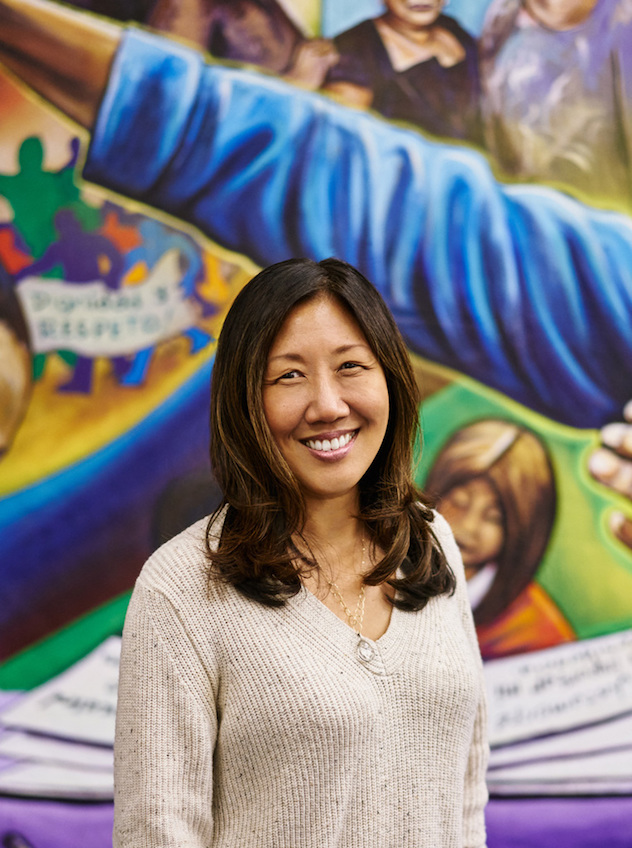More than two decades ago, Maisie Chin was working on an initiative with South Los Angeles schools to get more kids into college when a white teacher pulled her aside and said, “Maisie, these kids are just animals!”
The teacher, she could see, wanted her to agree with him. Chin was devastated. The incident stuck with her as she went on to co-found CADRE, a South L.A.-based parent organizing social justice non-profit pushing for systemic change in advancing education rights and opportunities for black and Latino students.
Chin, who grew up in an immigrant family home in Los Angeles, had long wanted to make the world a better place through leadership and community service, but said her initial vision – that she needed to “just help people” — shifted once she witnessed the divisions that fueled the 1992 riots.
During the riots, she saw for the first time how a larger system of oppression pit the Korean and black communities against each other. “We were all being played against each other to uphold a greater set of ideas that put profit over people, that put ‘good’ people over ‘bad’ people,” she said. “I didn’t quite know it then, but I picked a side.”
Today, Chin lives by the words of the lawyer and activist Mari Matsuda: “We will not be used.”
Matsuda has advocated for Asian Americans to consider that they are used to set a dangerous racial hierarchy among minority and immigrant communities, in which the idea of APIs as “good” immigrants and model citizens is turned into a weapon that protects white privilege and hurts blacks, Latinos and even other API groups that are left behind in convenient narratives that blanket disparities within the API community.
So, Chin asks, are APIs being used and, in turn, contributing to the problem? Can APIs redefine themselves in relation to other people of color? How can they play a different role?
Chin, who obtained a degree in urban planning at UCLA, said she consciously uses the privilege of her education to leverage and create room for the marginalized. She encourages other APIs to examine how they look at notions of “good” and “bad,” particularly in schools — key components of social mobility — as they relate to racial stereotypes, class and poverty.
How people of color are treated in those settings, she said, affects not just black and Latino communities but Asian and Pacific Islander ones as well. “We have a lot to contribute to racial justice, but we’re not using it,” Chin said. “I think the world we’re in right now is asking more of us than just to be personally responsible. We have choices in front of us. Figure out how to make each choice transformative, each and every day.”
In 2001, when CADRE was started in a living room, Chin and her team would go knocking on doors down 40 or so blocks in South L.A., asking black and Latino parents about their experiences with the public school system. Their stories were diverse, but the one thread that emerged was that the parents neither felt heard or respected, and that much of it was race-based — while schools would tolerate anger or questioning by white parents, those of color were labeled as troublemakers.
“You can’t advocate for your kids [when that’s happening],” Chin said. “If something is really wrong and you can’t speak up, and [schools] retaliate if you do, then that’s not racism toward kids. That’s racism toward parents. They can’t get involved.”
The organization has brought the community’s parents together to build toward advancing the quality of education, and access, for students. “I think racism toward parents is really where the lack of political will to improve our education is,” she said. “Yesterday’s alienated students are today’s alienated parents.”
Through the years, CADRE’s work on education policy reform has resulted in reductions in suspensions in the Los Angeles Unified School District, and seen positive change to discipline approach by schools. Its goals include the dismantling of the school-to-prison pipeline, which it’s tackled by co-founding a national campaign, Dignity in Schools.
Chin and her team’s focus on protecting the rights of parents to participate and engage in the decision-making that goes into their children’s education has seen the emergence of parent leadership and empowerment.
“I know how to create the conditions for people to center the most marginalized people and bring them into the margins, put them right in the middle, and have them be our greatest teachers,” Chin said. “I feel like I got to contribute exactly the way I wanted to contribute, from that moment in 1992.”
This article is a part of a series of portraits and stories, in celebration of Asian Pacific American Heritage Month, on API women who use their perspectives and voices to speak up and impact their communities. Read more here.






